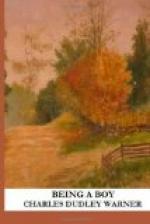V
THE BOY’S SUNDAY
Sunday in the New England hill towns used to begin Saturday night at sundown; and the sun is lost to sight behind the hills there before it has set by the almanac. I remember that we used to go by the almanac Saturday night and by the visible disappearance Sunday night. On Saturday night we very slowly yielded to the influences of the holy time, which were settling down upon us, and submitted to the ablutions which were as inevitable as Sunday; but when the sun (and it never moved so slow) slid behind the hills Sunday night, the effect upon the watching boy was like a shock from a galvanic battery; something flashed through all his limbs and set them in motion, and no “play” ever seemed so sweet to him as that between sundown and dark Sunday night. This, however, was on the supposition that he had conscientiously kept Sunday, and had not gone in swimming and got drowned. This keeping of Saturday night instead of Sunday night we did not very well understand; but it seemed, on the whole, a good thing that we should rest Saturday night when we were tired, and play Sunday night when we were rested. I supposed, however, that it was an arrangement made to suit the big boys who wanted to go “courting” Sunday night. Certainly they were not to be blamed, for Sunday was the day when pretty girls were most fascinating, and I have never since seen any so lovely as those who used to sit in the gallery and in the singers’ seats in the bare old meeting-houses.
Sunday to the country farmer-boy was hardly the relief that it was to the other members of the family; for the same chores must be done that day as on others, and he could not divert his mind with whistling, hand-springs, or sending the dog into the river after sticks. He had to submit, in the first place, to the restraint of shoes and stockings. He read in the Old Testament that when Moses came to holy ground, he put off his shoes; but the boy was obliged to put his on, upon the holy day, not only to go to meeting, but while he sat at home. Only the emancipated country-boy, who is as agile on his bare feet as a young kid, and rejoices in the pressure of the warm soft earth, knows what a hardship it is to tie on stiff shoes. The monks who put peas in their shoes as a penance do not suffer more than the country-boy in his penitential Sunday shoes. I recall the celerity with which he used to kick them off at sundown.
Sunday morning was not an idle one for the farmer-boy. He must rise tolerably early, for the cows were to be milked and driven to pasture; family prayers were a little longer than on other days; there were the Sunday-school verses to be relearned, for they did not stay in mind over night; perhaps the wagon was to be greased before the neighbors began to drive by; and the horse was to be caught out of the pasture, ridden home bareback, and harnessed.




